education for everybody
Learning and development for children and young people with special needs

Supporting children’s social and emotional wellbeing Brick by Brick
Issue Sixty Seven
New college to boost digital careers of disabled people
Why are we ignoring the diversity in neurodiversity?
by Dr Leanne Johnson
EMBEDDING TRAUMA INFORMED PRACTICE IN SEMH PROVISION

5 NO CHILD SHOULD GO HUNGRY! - THE LINK BETWEEN BREAKFAST AND CHILDREN’S HEALTH AND WELLBEING

10 NEW PROJECT MAKES SHAKESPEARE ACCESSIBLE FOR DEAF SCHOOL CHILDREN
12 NEW COLLEGE TO BOOST DIGITAL CAREERS OF DISABLED PEOPLE
15 ENSURING SMOOTH TRANSITIONS FROM START TO FINISH
17 LISTENING TO EXPERTS BY EXPERIENCE

18 OUTSTANDING OFSTED INSPECTION FOR PORTLAND COLLEGE
22 SUPPORTING CHILDREN’S SOCIAL AND EMOTIONAL WELLBEING BRICK BY BRICK

24 WHY ARE WE IGNORING THE DIVERSITY IN NEURODIVERSITY?
25 ALTRO EXPLORED INCLUSIVE DESIGN WITH NEURODIVERSITY FOCUS FOR CLERKENWELL
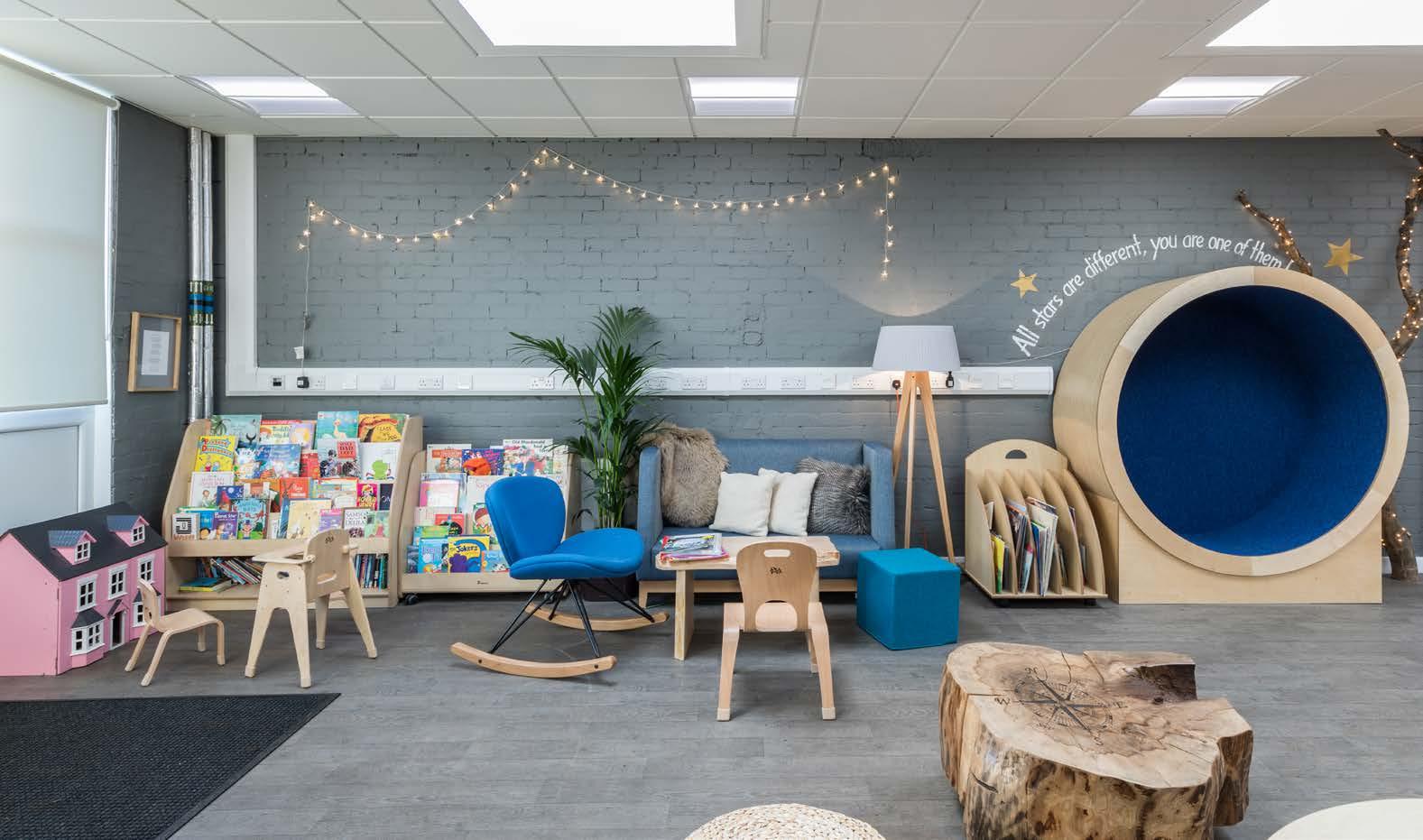
@educationforeverybody
PUBLISHED BY: Euromedia Associates Ltd



10 Ashfield Road, Chorley, PR7 1LJ
TEL: 01257 267677 | FAX: 01257 267711
www.educationforeverybody.co.uk
MANAGING DIRECTOR: Emma Hatherall
SALES: Rachel Morton
EDITOR: Nick Lavigueur
PRODUCTION MANAGER: Sheila Helm
DESIGN: Elle Creamer Printed by Buxton Press Ltd
Education for Everybody magazine would like to thank the advertisers that appear in this publication for their support, and wish them every business success. This publication is produced subject to the following conditions: That it shall not, without the consent of the Publishers, be given, lent, hired out, or otherwise disposed of by way of trade.
It shall not be lent, hired out or otherwise disposed of in any mutilated condition, or in any other unauthorised cover by way of trade or affixed to or part of any publication or advertising literary or pictorial matter whatsoever.
Euromedia Associates have made every effort to ensure that the content of E4E is correct. However, we cannot guarantee responsibility for any errors or omissions. The views expressed in E4E do not necessarily reflect those of Euromedia Associates or their employees, as per terms and conditions of acceptance.
All rights reserved.
Euromedia Associates do not accept any liability which may arise or result from any error in any advertisement whether relating to wording, space, position or artwork
/education4everybody
@e4emagazine REGULARS FEATURES 5 10 25 22
4 EDITOR’S LETTER 5 NEWS DIGEST 12 SPECIAL SCHOOLS, COLLEGES AND FURTHER OPPORTUNITIES 22 WELLBEING 24 NEURODIVERSITY
Cover Images (Front, Inside Front, Back, Inside Back) courtesy of Adobe Stock Photos
EDITOR’S LETTER
An inspiring selection of articles awaits.
Hello - welcome to another edition of Education For Everybody.
Earlier this year, the government published its plan for improving SEND delivery. The response from charities was mixed, but understandably many thought not enough reform was being proposed.
Tim Nicholls, Head of Influencing and Research at the National Autistic Society, said: the SEND system was broken and autistic children had been left without the support they needed in school for far too long.
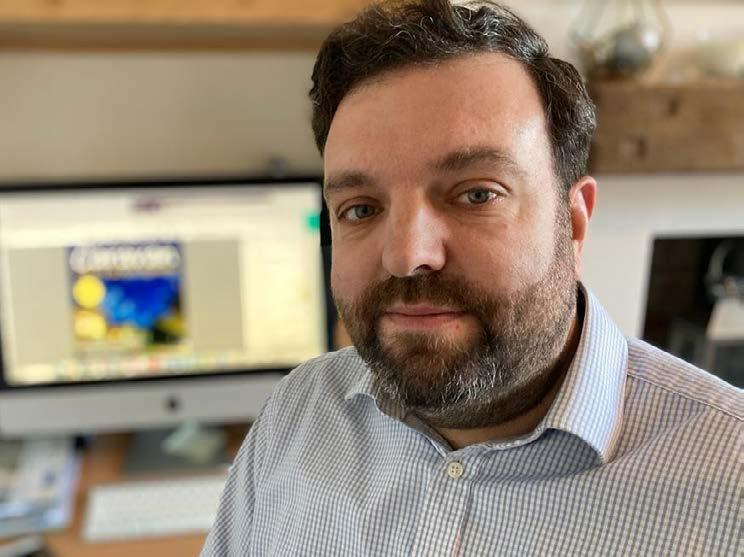
He commented: “While we welcome parts of the Government’s SEND Improvement Plan, we don’t think it’s enough to end the system-wide failings holding back 180,000 autistic children in England. The Government has a long way to go - we won’t accept a world where autistic children miss out on an education, and families are left exhausted and on the brink of crisis.”
Soundwaves Foundation, the deaf children’s charity that uses technology to aid learning, said the government plan didn’t go far enough - with investment being too little too late. It complained the plan to increase support by 2025 did not meet the ‘right time’ for SEND children struggling now and the funding of £70 million was inadequate in making a real long-term difference.
But nasen had a different take. It said it was ‘encouraged’ by the planned reform but acknowledged the improvement plan
wasn’t the finished article. Annamarie Hassall MBE, nasen CEO and Chair of Whole School SEND, said that it appeared that the government had ‘listened, acknowledged the issues, and committed to change’.
She commented: “The government’s reimagination of what a more positive experience for children and young people with SEND and their families should look like is warmly welcomed. The ambition of achieving a ‘more inclusive society that celebrates and enables success in all forms’ outlined in the plan is central to nasen’s work and was a key pillar in our response to the consultation.
“There are many children and young people for whom this transformational change to the system will arrive too late. And there is a great deal of trust required that the emphasis on SEND, the progress we’ve made to date and the plans for future change, will not be diminished by subsequent governments.”
More than two months on from the announcement, how are we feeling? Have there been any signs of follow through work beginning? If you want us to feature your thoughts on this, or anything else, please get in touch via nick@euromediaal. com
ISSUE 67 • WWW.EDUCATIONFOREVERYBODY.CO.UK 4
No child should go hungry!
British Nutrition Foundation and Magic Breakfast partner to investigate the link between breakfast and children’s health and wellbeing
The British Nutrition Foundation, a leading nutrition charity, and Magic Breakfast, a charity that is working to ensure hunger isn’t a barrier to learning for school children across the UK, have joined forces to raise awareness of the vital role of a nutritious breakfast in children’s health and wellbeing. With aligned views on the importance of diet and nutrition for children’s development, and a shared commitment to reducing child hunger, the partnership will explore the link between breakfast consumption and health in children and young people.
The partnership is particularly important as poor nutrition during childhood can increase the risk of developing both short- and longterm health problems. This is why schools are an essential setting for promoting healthy behaviours and providing meaningful opportunities for establishing healthier diets, including access to nutritious foods at mealtimes such as breakfast.
Research shows that breakfast can have a significant impact on children’s learning, with hunger interfering with attendance and behaviour in class. Worryingly, three million children risk starting

the school day hungry, highlighting the urgent need to address child hunger and the importance of diet inadequacy.
As part of the partnership, nutrition scientists from the British Nutrition Foundation will undertake and publish a narrative review, which will explore the scientific evidence examining breakfast intake in school aged children and how this impacts their nutrient intakes, health outcomes and performance and attainment at school. The review will also consider outcomes in children living in low-income households, as they are often the most vulnerable to food insecurity and poor nutrition. The British Nutrition Foundation will also host a roundtable event with key stakeholders, including multidisciplinary expert representatives, to discuss the findings and implications of the review paper.
Commenting on the announcement, Elaine Hindal, Chief Executive of the British Nutrition Foundation said, “As a nutrition charity, we are acutely aware of the impact a healthy diet can have on children’s health and wellbeing, and the challenges that many families currently face in being able to provide the
food their children need. We are delighted to partner with Magic Breakfast to look at the science behind breakfast and children’s health and how we can use this to make a real difference to children’s lives.”
Lindsey MacDonald, Chief Executive of Magic Breakfast, added, “Going to school hungry not only hinders children’s learning, it can also have serious long-term consequences on their health and development. We passionately believe that no child or young person should go hungry, and that a healthy and nutritious breakfast is a proven way to fuel learning and every child’s potential. This has never been more vital as the number of children struggling in the UK has more than doubled in the past year. Partnering with the British Nutrition Foundation, we are looking forward to building on
the work we do at Magic Breakfast and deepening our understanding of the impact that breakfast can have on the lives of children.”
The project being conducted as part of the partnership is supported with an educational grant from Arla, Heinz and Quaker, and comes at a particularly timely moment considering the cost-ofliving crisis and the growing impact of food insecurity and poverty on children’s nutritional vulnerability. By working together, the British Nutrition Foundation and Magic Breakfast hope to further develop a robust evidence base to support policy, make a real difference to the lives of children and reduce the impact of poverty on their health and wellbeing.
Magic Breakfast’s Hunger Report https://www. magicbreakfast.com/news/ hidden-hunger-reportfindings
WWW.EDUCATIONFOREVERYBODY.CO.UK • ISSUE 67 5 NEWS DIGEST
Image courtesy of iStock
ARC England CEO Barometer Survey shows provider confidence in sector is declining
The Association For Real Change (ARC England) Learning Disability Research Unit has published the findings of the first CEO Barometer, which found that the overall level of confidence that CEOs have in the social care sector is declining.
The CEO Barometer Survey found that 78% of leaders in learning disability services are feeling less confident in their financial situation than they were three months ago and 56% are feeling less confident in relation to workforce and staffing levels.

The CEO Barometer measures the health of the learning disability and autism sector across a range of key indicators:
• Staffing and workforce
• Wellbeing and morale
• Quality/Safety
• Financial Stress
• Overall ‘Confidence’ in sector and business
70% of our respondents said that they are concerned about workforce issues, 69% said they are concerned about commissioning practice and 56% said that they have concerns about financial sustainability.
This decrease in sector health confidence comes amid continued high demand for services; half of the
organisations (52%) reported that demand from individuals was high or very high, while over two-thirds (65%) said the same about demand from local authorities.
More than half (57%) of organisations report that their available spaces for the people they support are 91-100% occupied – with an overall average of 88% spaces occupied – and almost nine in ten providers (87%) say they have had to turn down requests for support at least some of the time. A lack of capacity (which in large part is likely to be due to staff recruitment and retention issues) is the most common reason for turning down requests (80%), with the second most common reason being that insufficient funding was offered (65%).
The CEO Barometer results echo the findings of the latest Hft Sector Pulse Check report, which reveals that a third of adult social care providers have considered a market exit in the past 12 months; this proportion rises
to half when considering the effect of financial pressures on smaller organisations.
With regard to workforce concerns, the CEO Barometer found that 82% of our leaders are concerned about their ability to pay their staff at competitive rates. This does not come as a surprise following the findings of our recent Fee Rate Freedom of Information request to all local authorities in England and Wales which found that 94% of Local Authorities are paying rates for supported living services that do not allow providers to meet their statutory obligation to pay the National Living Wage.
Almost all organisations agree that without immediate and radical change many good care providers will no longer be operating at this time next year (96%), that we need reform to ensure care and support is person centred (95%) and that the government needs to provide meaningful financial assistance to help with alleviate the cost of living crisis (95%).
ARC England calls on the Government to:
1. fund social care based on an agreed fair cost of providing care and support to people with a learning disability and autistic people, and
2. to take steps to ring-fence social care funding within local authority budgets.
We join with a growing number of social care sector voices urging the Government to act to secure realistic funding for social care. We are hopeful that the CEO Barometer data adds to the narrative to amplify these voices and put the sector on a sustainable footing in the face of rising costs and deepening workforce challenges.
6 ISSUE 67 • WWW.EDUCATIONFOREVERYBODY.CO.UK NEWS DIGEST
Image courtesy of iStock
Nasen announces appointment of three new editors to the Journal of Research in Special Educational Needs (JORSEN)
JORSEN is an established online forum, published by Wiley, for the dissemination of international research on special educational needs and has recently welcomed Dr. Verena Letzel-Alt, Prof. Dr. Marcela Pozas and Dr Susana Castro-Kemp to its editorial team.
three new editors for JORSEN”.
“After a thorough recruitment process, we are confident that we have selected three dedicated education professionals who are passionate about their research in SEND and committed to ensuring that children and young people can reach their full potential, through supporting and equipping the practitioners who support them.”
Talking about her new role, Co Editor-in-Chief, Dr. Verena LetzelAlt who is a Postdoc at the Section for Teacher Education and Research
Dr Verena Letzel-Alt and Dr Marcela Pozas will take up the roles of Co-editors in Chief, with Dr Susanna Castro-Kemp becoming the new Associate Editor.
Speaking about the new appointments, nasen’s CEO, Annamarie Hassall MBE said: “As acharitable membership organisation, rooted in research and evidenceinformed best practice, our journals are an important route to sharing the latest research and practice for special educational needs and disability. Our vision is to influence an equitable, inclusive education system, one that informs educators and policy makers alike. JORSEN provides a route for dissemination of scholarly articles from across the globe, therefore I am delighted to welcome co Editors in Chief from Universities in Berlin and Mexico. Along with a UK based Associate editor, the new team of three will be a welcome addition. I would like to thank the retiring Editor, David Armstrong for his commitment and leadership of JORSEN. I am sure he will be delighted to hand over to
at the University of Trier, Germany, said: “I am more than happy, and it is a great honor for me to work with nasen and Wiley. We want JORSEN to stand for reliability and highest quality standards, as well as for internationality and accessibility. There is a great potential for this to be developed in the upcoming years and I am really excited to see what this ambitious team will be able to achieve. “
Prof. Dr. Marcela Pozas, Co Editorin-Chief, who holds a professorship

with focus on inclusion and participation within the school context in the Professional School of Education from the Humboldt University in Berlin, Germany and who is a lecturer at the School of Psychology from the University of Monterrey, Mexico said: “It’s a true honour to work closely together with nasen and Wiley. Our goal for JORSEN is to expand its visibility and make high quality research accessible, while addressing the new and recurring challenges within our field. I am more than delighted to be able to go on this journey together with the new editorial team.
And Dr Susana Castro-Kemp, Associate Editor, who is an Associate Professor in Psychology and Human Development at University College London (UCL) also said: “I am delighted to be joining the editorial board of JORSEN! It is an exciting time to be joining Wiley and Nasen on this venture. We have a fabulous team with great ideas, and I am confident that together we will reframe JORSEN as one of the leading journals in the field.”


WWW.EDUCATIONFOREVERYBODY.CO.UK • ISSUE 67 7 NEWS DIGEST
E-ACT & Tes join forces to create ondemand SEND thought leadership for all
Following the release of the government’s Green Paper last year on SEND provision, the Multi Academy Trust, E-ACT has teamed up with Tes to hold its third ‘E-ACT Ideas Conference’ to delve deeper into this important topic.

Agroup of SEND experts from across the education sector will tackle some of the burning issues in SEND provision in a virtual conference. Due to potential pressures on time to attend, the conference has been shared as an on-demand recording, making it a fantastically flexible resource.
The Conference titled ‘SEND and inclusion for all’, covers topics such as: the drive for improved mainstream provision, how greater national consistency can be achieved, and what good should look like for the support and funding for children within our education system. The conference is ideal for anyone looking to learn more about SEND or those working with SEND pupils, including teachers, academics, mental health specialists and healthcare professionals to name a few.
E-ACT launched its ‘Ideas Conference’ series in October 2021, to create opportunities for colleagues across the sector to come together and share ideas. The premise behind
this initiative was ‘If an idea helps just one person, we think it should be shared’.
Jon Severs, Tes Magazine Editor said “The E-ACT ideas conferences are a great opportunity for people across the sector to get together and learn from each other. It’s CPD, idea generation and thought stimulation all-in-one and for free. We are delighted to partner on this great initiative.”
Simon Tanner, National Director of SEND, E-ACT added; “SEND is such a vital area, now more than ever and with the publication of the improvement plan, we have clear areas of focus. We wanted to provide a space for those who work within the SEND system to come together and learn from each other. The speakers taking part in this conference will be able to share their expertise as well as stimulate discussion and provoke reflection from attendees. The ondemand format means colleagues in the sector can also benefit from it for months to come.”
Speakers with a wide range of
expertise who contributed to the conference, included:
• Tom Campbell, CEO, E-ACT
• Andre Imich, Department for Education
• Dr Nicola Crossley, CEO, Liberty Academy Trust
• Jon Severs, Editor, Tes
• Simon Tanner, National Director of SEND, E-ACT
• Marcia Brissett-Bailey, speaker, author and co-founder of the British Dyslexia Association Cultural Perspective Committee
• Dr Helen Curran, Senior lecturer in education, SENCO, Bath Spa University
• Julie Wharton, Senior lecturer and NASENCo course leader, University of Winchester
• Simon Lock, Head of product and partner content, Tes
• Rhian Huxtable, Primary SEND specialist, E-ACT
To find out more and to sign up for the free on-demand recording simply visit:
www.e-act.org.uk/send-andinclusion-for-all/
8 ISSUE 67 • WWW.EDUCATIONFOREVERYBODY.CO.UK NEWS DIGEST
Image courtesy of iStock
Embedding trauma informed practice in SEMH provision
The 3Cs Model
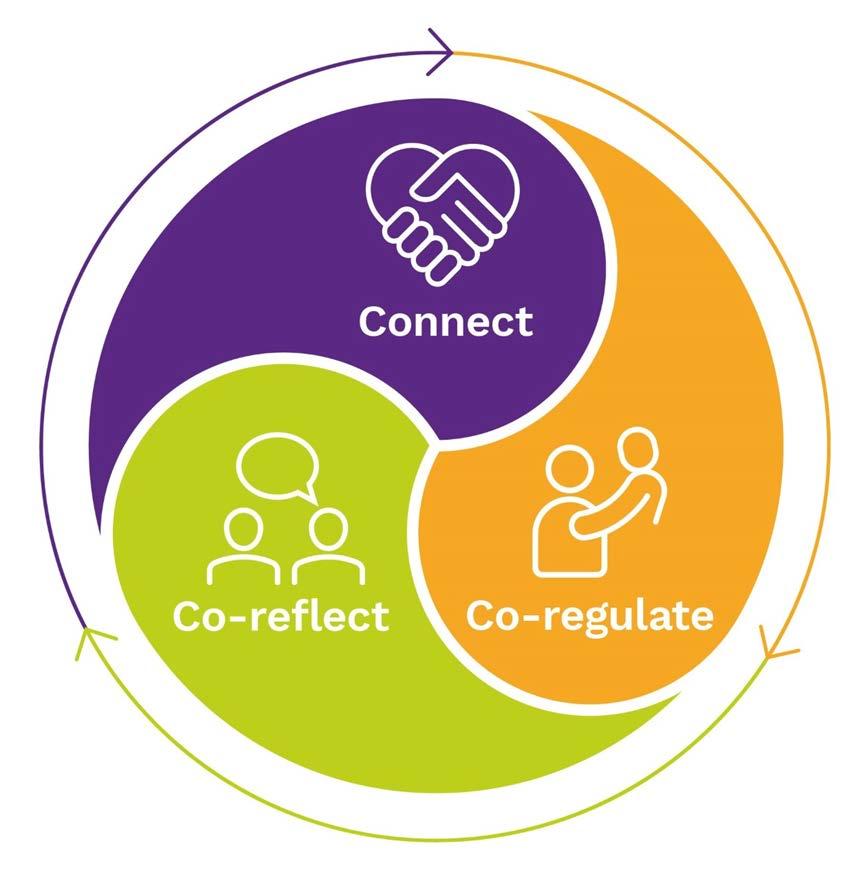 By Dr Leanne Johnson
Dr Leanne Johnson is Head of Trauma Informed Practice at Outcomes First Group (OFG), a specialist provider of education and care for autistic children, young people and adults and those with complex needs.
By Dr Leanne Johnson
Dr Leanne Johnson is Head of Trauma Informed Practice at Outcomes First Group (OFG), a specialist provider of education and care for autistic children, young people and adults and those with complex needs.

Understanding the impact of complex trauma on a child’s early development, their internal world and the subsequent survival strategies they develop, is crucial to responding to and supporting young people with social, emotional and mental health (SEMH) needs. It is vital to create an empathic and positive approach. By embedding
Trauma Informed Practice (TIP) we can help empower young people and those supporting them to understand how trauma has impacted them, and support recovery from early trauma to enable positive futures.
Developmental trauma impacts the individual on a relational, emotional and behavioural level, negatively impacting selfconcept and body biology. They may develop survival skills that push others away, as they have learnt they must survive and cope on their own, or be drawn to subconsciously reenacting their early trauma. Some feel emotions faster and more intensely and
struggle to re-regulate. Their trauma therefore also impacts those closest to them.
Supporting colleagues to understand and mitigate the personal impact of working with trauma, is critical to creating a reflective and responsive therapeutic environment. It can require huge persistence to form positive and meaningful relationships with those with lived experience of trauma.
We embed reflective practice groups within teams and services, to provide protected time to ‘press the pause button together’. This enables us to recognise some of the complex relational processes, such as transference and countertransference, to help develop and protect a responsive, reflective and positive culture.
With the 3 Cs Model of Trauma Informed Practice, I aimed to create a simple and accessible TIP model to promote standardised practice across OFG’s 52 schools and residential provision. The training is accredited by the British Psychological Society (BPS) for the purposes of Continuing Professional Development.
The four day training begins with an introductory
day providing a summary of TIP which includes: the impact on ourselves of working with trauma - secondary trauma, transference and counter transference; the impact of trauma on young people and how it presents in our services as well as the 3 C’s Model of TIP. The next stage of training is The Foundations of TIP, with a day each focussed on Connect, Co-Regulate and Co-Reflect.
Connect - reaching out to young people to enable them to feel ‘seen’ and kept in mind with an emphasis on repairing relationships in a non-shaming way
Co-Regulate - develops a sense of safety and supports young people to develop skills to respond to their emotions and behaviour
Co-Reflect - supports traumatised children to learn safe and effective ways of living their lives through integral therapeutic boundaries
Through Trauma Informed Practice we can meet and respond thoughtfully and empathically to a child or young person’s underlying need, rather than responding to their behaviour. By working in this way, we can help young people in their recovery from trauma.
WWW.EDUCATIONFOREVERYBODY.CO.UK • ISSUE 67 9 NEWS DIGEST
New project makes Shakespeare accessible for deaf school children
University of Birmingham academics and the Royal Shakespeare Company (RSC) have joined forces in a new project to make Shakespeare accessible for deaf children in schools.

This pioneering initiative is the result of a longstanding collaboration between the RSC and the University of Birmingham, beginning in 2016.
There are over 50,000 deaf children in the UK and these pupils are more likely to underperform in school compared to their hearing peers.
Shakespeare is still the only named author that all children are required to study at age 11-14, and this work can be challenging for children and young people of all ages and abilities. But the exploration of Shakespeare’s plays and language can also be a way of unlocking potential and
raising aspirations.
The RSC has worked for a number of years to create resources and training that support teachers and young people to explore Shakespeare plays using approaches that actors and directors use in the rehearsal room.
Together, the University of Birmingham and the RSC have developed a suite of resources that ensure deaf students have high-quality access to the plays. They have worked with deaf actor and director Charlotte Arrowsmith and other deaf actors to film scenes from the plays in British Sign Language, around which they have built a scheme of work.
Dr Abigail RokisonWoodall, Deputy Director (Education) and Associate Professor in Shakespeare and Theatre at the Shakespeare Institute, who co-led the Signing Shakespeare project said: “Signing Shakespeare is an educational resource programme which brings together visual and active learning for the study of Macbeth, so we can try and address the gap between hearing and deaf students in school, particularly when it comes to English Literature.
“Shakespeare, as well as being a compulsory part of the curriculum in England, is part of our national identity, so it is wrong that for so
many young people they just can’t be as involved with Shakespeare as other students, simply because the resources aren’t there.”
These newly developed resources for studying Macbeth allow deaf students to explore the story, characters, relationships, themes, imagery, rhythms, and literary devices in the play. The programme features collaborative activities and writing tasks which support students to develop understanding of the different perspectives and layers within the text, all built around a series of films which are performed by deaf actors using British Sign Language.
10 ISSUE 67 • WWW.EDUCATIONFOREVERYBODY.CO.UK NEWS DIGEST
Images courtesy of iStock
Dr Rokison-Woodall, who herself is the parent of a deaf child, continued: “As part of our ongoing collaboration we worked with deaf actors, students, practitioners, and teachers of the deaf to create the programme. It was important that we made Signing Shakespeare engaging and exciting so that students would enjoy the experience of learning about the play.”
One of the challenges that the academics, actors, and collaborators came up against with making the BSL performance films was creating new sign names for characters. There currently aren’t any standardised BSL signs for many character names in Shakespeare’s plays, so the experts behind the project created signs which could be integrated into the BSL performance. For example, the sign name for Macbeth uses a combination of the sign for ‘ruler’, the BSL sign for the letter M and a clawlike hand-shape – which alludes to the dragon that one of the actors found on the crest for the Macbeth clan. Doing this allowed the actors to work with the academics to get creative and explore the nuances of BSL, just as you would if you were verbally speaking the script.
Dr Tracy Irish, Associate
Learning Practitioner at the RSC, said: “This has been an amazing project to work on - not just in creating resources to support deaf young people to engage in the richness of Shakespeare’s language, but also for what we have learned about what those young people’s understanding and experiences can bring out in Shakespeare.
“All young people get the best out of Shakespeare when they are encouraged to engage critically, creatively and playfully, and find what the plays can mean for them now. Our resources are focused particularly on supporting deaf students in that study. Working with sign language has given us a different and deeply enriching perspective on how language works that we believe could be of benefit to all young people whatever their level of hearing.”
She adds, “A real strength of this project has been the collaborative community of practice; we have worked with teachers, students, artists, and academics. I really hope we can continue to build that community as we develop the Signing Shakespeare practice.”
Jacqui O’Hanlon, Director of Learning and National Partnerships at the Royal
Shakespeare Company said: “We know that Shakespeare’s work can become an entry route for learners of all ages and abilities to make discoveries about themselves, each other and the world we live in. The Signing Shakespeare resources will help ensure that deaf students are able to enjoy, learn about, participate in, shape, produce and make performances of Shakespeare’s work. We hope the resources will be useful in classrooms for deaf and hearing students. We are heartened that the British Sign Language Act was passed by Parliament in 2022. We hope to now work with other arts organisations and schools to standardise the signs for character names in Shakespeare”
Deaf actor Sophie Stone, who plays Lady Macbeth in the films, and has played Jaques at Shakespeare’s Globe commented: “This has been a passion project that has evolved into a vital and urgent resource for young people to access Shakespeare’s world and language. This isn’t just a project for Deaf people, but a project which bridges the Deaf community and the Hearing, the linguistics of written and visual languages and the steady growth of inclusion within education. Shakespeare’s works have long been considered for the elite, inaccessible for contemporary audiences and academically exclusive. But Shakespeare himself wrote about, and for, people of all backgrounds. Gifting this rich part of history to today’s Deaf community shows that care and consideration have been made and the door to
this experience is opened to those who deserve it too.
“The translation process is an education in itself: one word in Shakespeare’s works can have several meanings and sign language offers a layered, multidimensional experience that enriches the scripts. In order to translate a sentence, a complete understanding of it is required, there’s no hiding behind how it ‘sounds’. Showing the possibilities of visual language lifting written words off the page makes for an immersive and explorative opportunity for young people to delve into and enjoy all that Shakespeare can offer. Why would anyone want to deny someone of that? Shakespeare is, and should be, for all.”
Dr Rokison-Woodall concluded: “I was staggered at the lack of resources available to deaf students for the study of Shakespeare. We hope that by starting with one of the most famous plays, we can develop a way of working which can be applied to all of Shakespeare’s work, and potentially even more of the texts taught on the National Curriculum.
In 2023, with the BSL Act having been passed last year, it just doesn’t make sense that something as important as Shakespeare isn’t readily available for all students and audiences. Signing Shakespeare is one step in the right direction.”
Signing Shakespeare is available for teachers to access through the Royal Shakespeare Company website. https:// www.rsc.org.uk/learn/ schools-and-teachers/ teacher-resources/signingshakespeare-for-deafstudents/

WWW.EDUCATIONFOREVERYBODY.CO.UK • ISSUE 67 11 NEWS DIGEST
New college to boost digital careers of disabled people
A brand new college for young adults with special educational needs and disabilities (SEND) has opened in Manchester.
DISC (Digital Independent Specialist College) offers young people aged 16 –24 the chance to learn web development, videography, photography, graphic design, coding, animation and project management in a small-scale, supported environment that is personalised to their needs and talents.
Since opening its doors, 30 students with autism, learning disabilities and other additional needs have enrolled with DISC to develop and practise a range of creative and digital skills. All tutors at the college have experience of training and supporting neurodiverse people and have worked

in Manchester’s own digital industries.
The specialist college was set up by Digital Advantage, a charity that has delivered digital work experiences to over 5,000 young people of all ages and abilities in Greater Manchester and the North West, since 2015.
DISC is currently funded by the Education and Skills Funding Agency (ESFA), and local authorities across the region.
The specialist college offers two main programmes. The first is a flexible Pre-Internship, based on students’ interests and delivered in partnership with SENDCode, a social enterprise that supports young, neurodiverse people. The Pre-Internship includes
remote learning, work at DISC’s city centre studio and, where appropriate, external work placements with supporting businesses.
The second is a Supported Internship, a year-long, full-time programme for young people with an Education, Health and Care Plan (EHCP). Students can also access pastoral, peer-to-peer and weekly maths and English support.
Both programmes give interns experience of what it feels like to work in a digital job. They work on real life briefs from Manchester employers such as Manchester City Council, Northern Care Alliance NHS Foundation Trust and Jason Lock
12 ISSUE 67 • WWW.EDUCATIONFOREVERYBODY.CO.UK SPECIAL SCHOOLS, COLLEGES & FURTHER OPPORTUNITIES
Productions, as well as the chance to build their own digital portfolio.
Staff work closely with interns to help them find the right job or education once their internship has ended. This might be an apprenticeship with a partner employer or freelance work supported by Digital Advantage.

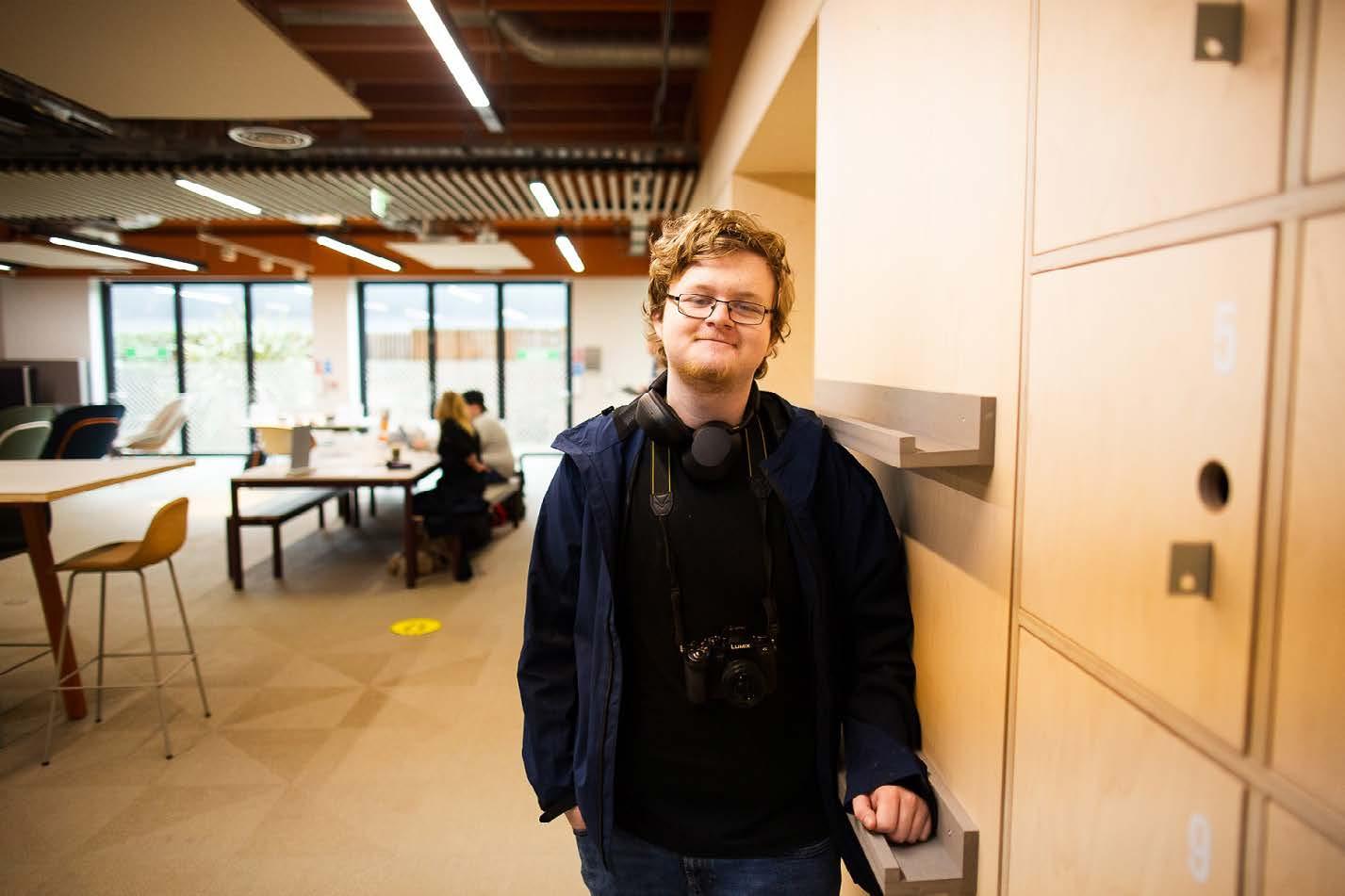
Diane Ainsworth, deputy headteacher of Manchester special school, Pioneer House High School, trustee of Digital Advantage and chair of Governors at DISC said, “Around the age of 16, many students with special educational needs and disabilities leave school - where they’ve felt secure and nurtured for many years - and start a big, mainstream college. Lots of them subsequently drop out or struggle because they feel lost. We started DISC to give young people
with learning disabilities a range of inspiring and supportive study options that align with their needs and digital

career ambitions.”
Andy Lovatt, founder of Digital Independent Specialist College (DISC) and CEO of Digital Advantage said, “It’s shocking that only 29% of autistic adults in the UK are in paid employment, and that figure is just 4.8% for adults with learning disabilities. Young people with disabilities are still guided towards traditional supported internships in retail, hospitality or healthcare and for some people this is right, but for many, these roles limit their aspirations and career progression. DISC helps young people with a passion for digital to get their dream job. We’re disrupting expected pathways for SEND young people.”
Dylan O’Brien, 19, from Gorton in Manchester has autism and dyspraxia and is doing an apprenticeship with Digital Advantage, the charity that set up DISC. He said, “I left school in year 8 because I got no support, it was overwhelming, and I struggled to get in on time. When I went to a mainstream college it was the same: no support, the work was too easy, and I ended up not going in. Things are different with Digital Advantage. Everything is personalised to you. There aren’t big classrooms or hundreds of students. If you ever need help you can get it. Every day I go to their Manchester studio and make websites, edit videos and take photos. I’m really happy with the progress I’ve made.”
WWW.EDUCATIONFOREVERYBODY.CO.UK • ISSUE 67 13
SPECIAL SCHOOLS, COLLEGES & FURTHER OPPORTUNITIES
Images courtesy of DISC
Our vibrant community works together to create a relaxed and positive environment that helps our young adults prepare for real life.
z Exceptional pastoral care and student support
z Excellent learner outcomes
z Wraparound independence development programme
z Unrivalled sports, leisure and wellbeing activities
We are Derwen! A specialist college for young adults with special educational needs and disabilities (SEND), including:


z Learning and physical disabilities
z Autism
z Behaviours of concern
z PMLD
In 2022, we were honoured with the Queen’s Award for Enterprise, endorsed by Her Majesty the Queen. The award recognises the education and vocational training we provide for young people from across the UK.
www.derwen.ac.uk

For adults withdisabilitieslearning
By creating a space for our students to develop handson, practical experience we’re giving them the freedom to imagine what’s possible and empowering them to achieve it. Tel: 01691 661234 admissions@derwen.ac.uk

Short Breaks and Respite Care at Derwen offers adults with learning disabilities and associated needs the opportunity to take a break and enjoy themselves.

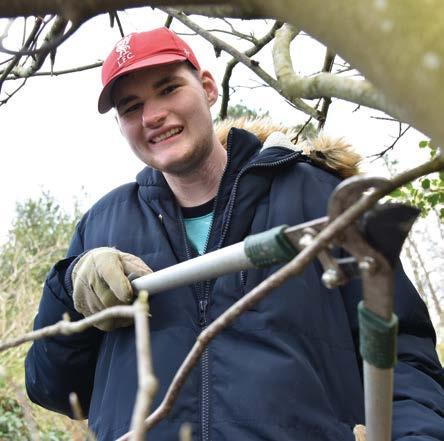


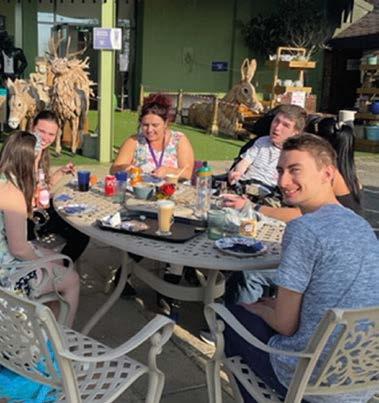
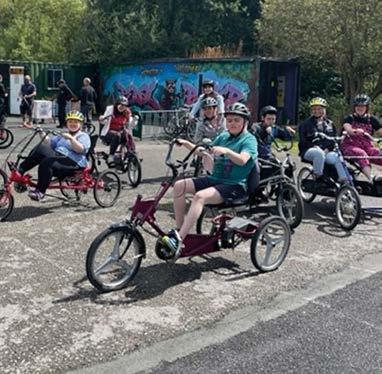

Holidays can be a great opportunity to relax with friends, meet new people and explore local attractions.
We have highly trained staff that can cater for individual needs.
We will help ensure you undertake activities around your preferences and wishes so you will want to come back again and again.
• cooking
We build your programme of activities around what you enjoy doing.
It may include:
• swimming
• trips to local attractions
• games console
ISSUE 67 • WWW.EDUCATIONFOREVERYBODY.CO.UK 01691 779243 | shortbreaks@derwen.ac.uk | www.shortbreaksatderwen.ac.uk
Gobowen, Oswestry Shropshire SY11 3JA
An initiative of Derwen College Charity RCN: 1153280
2022
Images courtesy of Derwen College
Ensuring smooth transitions from start to finish
and therapy staff, as well as schools, local authorities, therapists and experts involved in student’s care, to ensure we have the right support in place from the very beginning.
At specialist further education college, Derwen College, in Shropshire, we are dedicated to supporting students to achieve and exceed expectations. A robust transition process, that’s reviewed regularly, is vital for progression. Believe it or not, even while we’re ensuring that each student’s transition from school to our college is a smooth one, we’ll already be looking ahead to the next transition, perhaps towards further training, employment or greater independence.
Students beginning with us are encouraged to look to the future so we can support them towards their goals. Important questions include: What are you good at? What do you enjoy? What employment options are available to you after college? And Where would you like to live?
The Admissions team urge families to start looking at post-16 options early – up to three or four years before start date; attending transition events and open days.
At Derwen, we work as a team with care, teaching
This transition process continues through College. Training for work and independent living, as well as a careers programme, travel training, and health and wellbeing education (which includes a hugely successful Duke of Edinburgh’s Awards programme), all provide students with the scaffolding needed for a successful transition to life after College.
For most students, work experience is an important part of learning for the future. Students work in the college’s on-site ‘Marketplace’ – which includes a garden centre and gift shop, charity shop, café, restaurant and training hotel. When ready, they progress to external work placements at one of the many local and national businesses we partner with.
Looking ahead to transition after
College
makes an enormous impact to a young person’s ambitions and future success. A clear transition process enables students to be involved in setting goals and achieving aspirations.
In recent years – during the pandemic – transition to work hasn’t always looked straightforward, yet the College team worked hard to achieve brilliant

outcomes. For example, Hospitality and Food student Carter excelled in his work in the College’s small training hotel and was offered a housekeeping job at Premier Inn. Sadly, Covid struck and Carter was unable to take up the job offer until nearly a year later. He was supported in his transition by his former Derwen Hospitality teacher who accompanied him to his local Premier Inn on several occasions, and helped him to learn updated rules and regulations which had been brought in.

Carter now lives in a shared house with friends and has a paid job.
Carter’s mum, Pam, says: “Thank goodness for this amazing provision at Derwen. The mini training hotel at Derwen has created fantastic opportunities for so many students. My son is now a valued member of Premier Inn staff.”

We are proud to say that working together with
valued stakeholders from across the UK, Derwen can support students to focus on and achieve ambitious transitions.
Carter’s mum sums it up in one sentence.
“Derwen gave Carter the skills and confidence he needs to live the life he wants and deserves.”
For more information visit the College website at www.derwen.ac.uk
WWW.EDUCATIONFOREVERYBODY.CO.UK • ISSUE 67 15 SPECIAL SCHOOLS, COLLEGES & FURTHER OPPORTUNITIES
Transition is a big step for any young person. For a student with special educational needs or disabilities (SEND), the challenges of progressing from a familiar environment can be particularly difficult.
Images courtesy of Derwen College
Ellen Tinkham School partners with music therapy specialist to support wellbeing and development of its pupils with special educational needs
Ellen Tinkham School in Exeter is offering its pupils a specialist music therapy service to support them with needs primarily relating to their social, emotional and mental health, and communication and interaction.


provide music therapy but there is potential for other arts therapies support to be introduced later in the year.
Referrals to music therapy will be made for a range of reasons, including for those pupils who may be finding it difficult to form trusting relationships with others, who are experiencing high levels of anxiety or low mood, who are unable to express and manage their emotions effectively, and where specialist input is needed to support pupils’ development in relation to communication and interaction.
pupils in achieving positive outcomes, whether in relation to their emotional wellbeing, communication, social skills or attention, which can ultimately help children to overcome certain barriers to learning.”
The therapy will be provided by Chroma, the UK’s leading arts therapies organisation within the health, education and social care sectors, and builds on its existing partnership with Pathfield School in Devon, which is also part of the SENtient Trust, where Chroma have been effectively supporting pupils over the past two years. Chroma’s work is evidenced via the East Kent Outcomes System (EKOS) which provides very clear data on progress towards therapy goals.
Many pupils at Ellen Tinkham have difficulty communicating verbally or articulating their thoughts
and feelings effectively and this is where music therapy can help them express, explore and better manage their emotions as well as allowing them the opportunity to process their emotions and experiences through an effective means.
Initially, Chroma will
Lucy Collings Pettit, a senior therapist at Chroma, said: “Delivering music therapy to children and young people at Ellen Tinkham offers an opportunity for pupils to express their thoughts, feelings and emotions. The fundamental role of music therapy in the school setting is to support
Nikki Burroughs, Executive Head at Ellen Tinkham, added: “The past couple of years have been particularly difficult, especially for our pupils, and the success at another SENtient Trust school only serves to strengthen our trust in the value of music therapy and arts therapies. So, I am delighted to be able to offer music therapy again in our school to a wider cohort of pupils in addition to those who already have this on their EHCP.
“It is important for schools to support pupils with their development in different areas, including support for addressing and processing their emotions and experiences in a healthy way. Mental health struggles continue to significantly affect growing numbers of children and young people across the UK. Having this service directly available within the school, in a familiar setting, should encourage high levels of engagement and allow our pupils to receive timely support when the need arises.”
16 ISSUE 67 • WWW.EDUCATIONFOREVERYBODY.CO.UK SPECIAL SCHOOLS, COLLEGES & FURTHER
OPPORTUNITIES
Images courtesy of Chroma
Listening to experts by experience
In this article, Natspec’s Policy Officer, Kirsten Jones tells
colleges have said they want from the staff who work with them.
with being given enough time to respond.
They said when they are working in groups it is important to make sure all students are listened to and to remember that some students’ communication challenges mean they may communicate differently.
Respect
that this was important to ensuring they are in the right environment and headspace to learn new skills.
Include
Tfindings of a piece of student led research undertaken by members of Natspec’s Student Voice Parliament who themselves have learning difficulties and/ or disabilities. They asked their fellow students questions about what makes a good tutor or support worker, what they need to develop their skills and how college is preparing them for their post-college lives.
The findings revealed that a valued student
experience is one where students feel they are listened to, respected and included.
Listen
Students told the researchers that a good teacher or support worker is someone who listens to them and takes the time to get know them and understand their wants, needs and preferences.
They said it was important they are given enough time and support to understand what is being asked of them along
Staff in colleges, being friendly, patient and understanding is valued by students. They said that feeling respected in college helps them to develop the skills they will need in their post-college adult lives. e.g. confidence and self-advocacy.

The research revealed how students valued their opinions being sought and being involved in decision making, e.g. about their timetables, where they go for work experience or what they will do after college.
They also said it was important they were given clear explanations about changes that were made to their days. E.g. when there would be disruptions to their normal routines like when they would be working with new or different staff to usual.
Students highlighted the importance of respecting their sensory needs and how staff should avoid putting students in scenarios where they could feel overwhelmed. They said
Students said they thought their time in college was helping them to lead more included lives through teaching them to be more independent, learning to make choices and use technology, developing their confidence in decision making, planning for their future and accessing their wider communities. They said that being included in setting their own learning goals and assessing the progress they are making gave them ownership and increased their motivation.
Natspec’s Student Voice Parliament is open to all Natspec’s member colleges. The Parliament meets twice a year and colleges can attend either in person or online. Each Parliament is Chaired by members of the hosting college’s Student Council and the Parliament agenda is set by members of the Parliament. It is typically attended by around 150-200 students who attend specialist further education colleges across England and Wales. For more information visit Natspec.org.uk/services/ student-voice-parliament or contact Kirsten.Jones@ natspec.org.uk
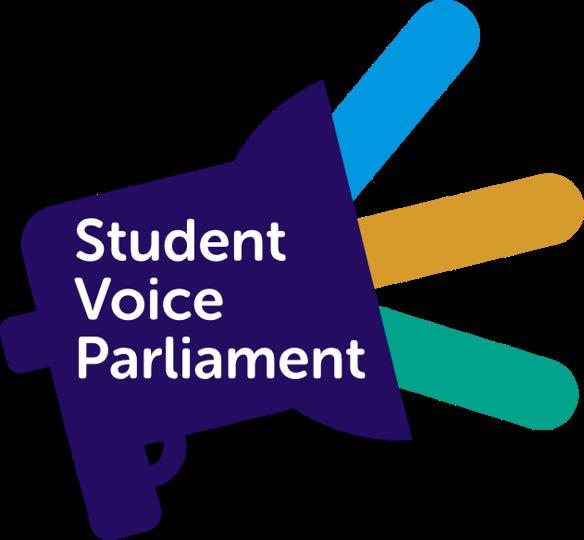
WWW.EDUCATIONFOREVERYBODY.CO.UK • ISSUE 67 17 SPECIAL SCHOOLS, COLLEGES & FURTHER OPPORTUNITIES
us about what students with learning difficulties and disabilities attending specialist further education
Outstanding Ofsted Inspection for Portland College
Portland College was graded Outstanding in every category following their Ofsted Inspection in January 2023.
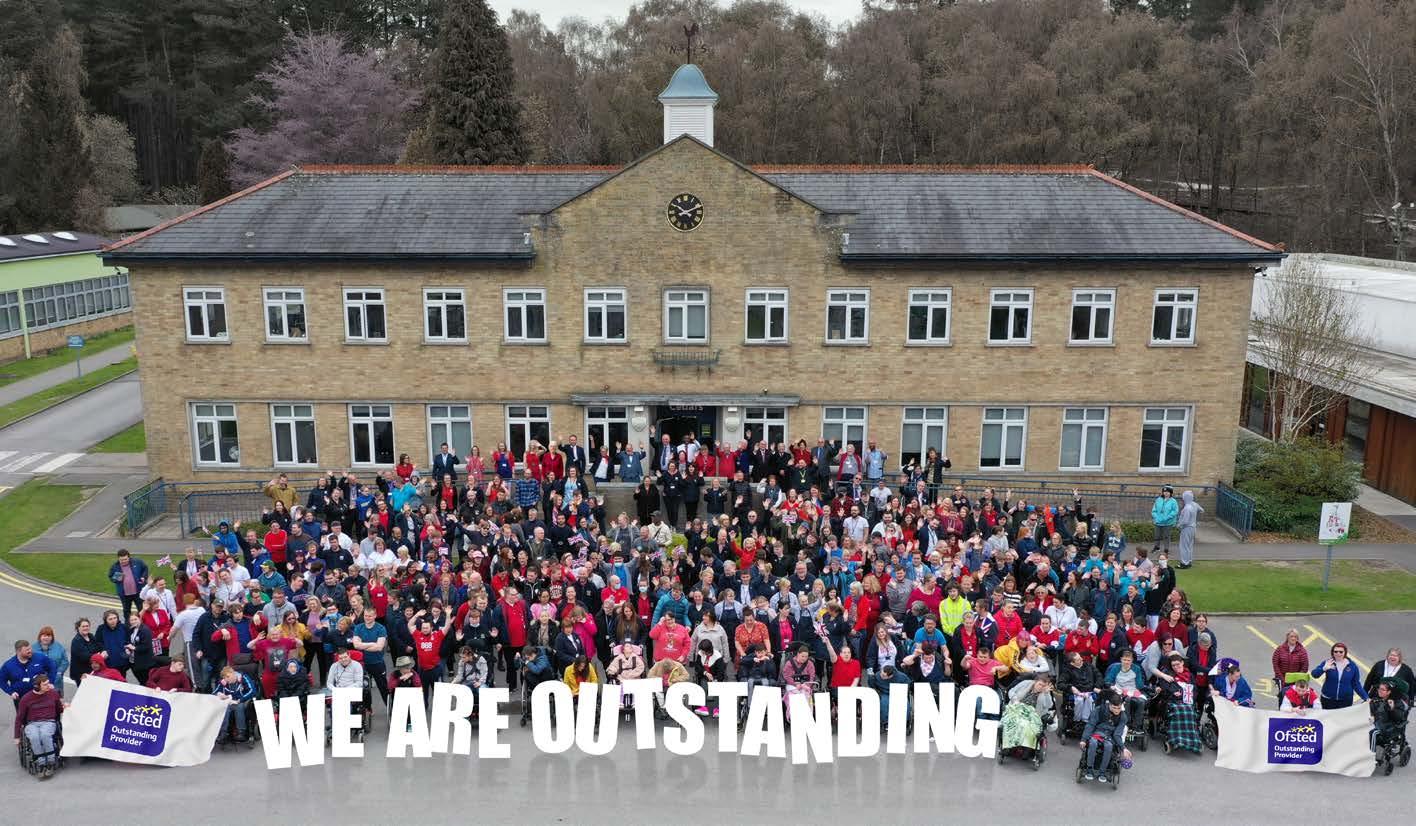
Four Ofsted Inspectors assessed all elements of the further education provision in an intensive 3-day inspection.
Ofsted Inspectors commended the happy vibe of the College, “From the moment learners arrive on the expansive college grounds, they are greeted by kind and caring staff who welcome them each day.”
“Learners benefit from a highly personalised and ambitious curriculum and make excellent progress to achieve their learning goals.”
“There is an unwavering commitment demonstrated by staff to promote and facilitate learners’ personal development.”
“The majority of learners move onto meaningful destinations after college such as adult day services, supported living, employment or further study.”
Tim Richmond, Chairman commented, “It is an enormous privilege to be involved as Chair of
Governors at Portland College, which, due to the positivity and commitment of our learners, together with the professionalism and dedication of staff and volunteers, creates the special Portland ethos, and I’m delighted that their efforts have been recognised by the Ofsted inspectors in achieving Outstanding grades across the board.”
Dr Mark Dale, Principal and CEO commented, “We are delighted that the hard work of our wonderful learners, amazing staff and dedicated volunteer governors has been recognised with the highest grade possible from Ofsted.”
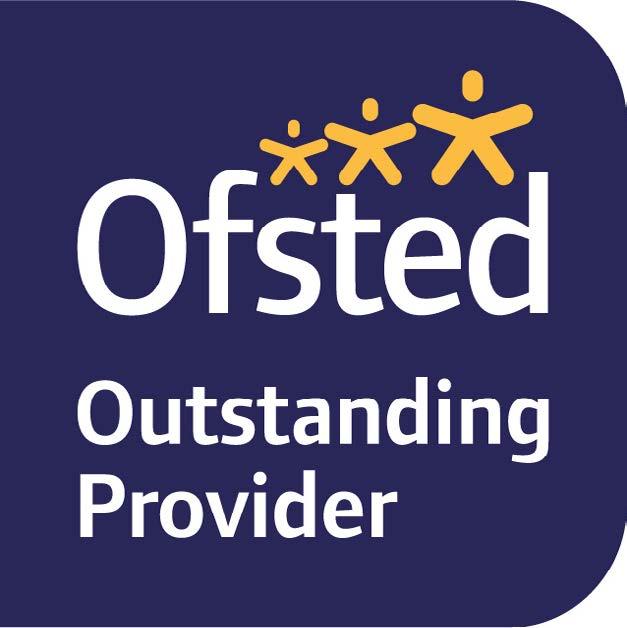
“We work really hard every day to ensure our learners have access to the best specialist education and facilities, supported by an excellent multi-disciplinary team to meet their individual needs.”
About Portland College

Our vision is that all people with
disabilities will have a lifetime of opportunity.
Based in Sherwood Forest, near Mansfield, with an excellent residential provision for people who live further away, Portland College offers a range of vocational programmes for people aged 18-25 with an Education, Health and Care Plan.
Our College curriculum is also available in the stunning grounds of Wollaton Park, Nottingham where we teach Horticulture and Construction Trades.
Portland is proud to hold Advanced Accreditation from the National Autistic Society, their highest accolade possible.
The Portland Charity group also offers a range of additional services for people with disabilities, including Day Service, Short Breaks, alternative provision at Pollyteach School and Portland Pathways, our mental health and employment service.
To find out more about joining Portland or our exciting range of career opportunities call us on 01623 499111 or visit www.portland.ac.uk.
18 ISSUE 67 • WWW.EDUCATIONFOREVERYBODY.CO.UK
SPECIAL SCHOOLS, COLLEGES & FURTHER OPPORTUNITIES
We are Outstanding You can be too.

Portland is a happy and safe place where you will make lots of friends and really fit in. Our Outstanding education programmes are tailored to meet your individual needs and help you achieve your goals, your way. Based in the heart of Sherwood Forest, we offer Day and Residential education programmes on campus, or Nottingham learners can choose our new Portland @ Wollaton Park programme. To find out more or book onto our next virtual open day, visit www.portland.ac.uk
Portland College
Nottingham Road, Mansfield, Nottinghamshire, NG18 4TJ
T: Main College Reception 01623 499111

E: marketing@portland.ac.uk www.portland.ac.uk
From the moment learners arrive on the expansive college grounds, they are greeted by kind and caring staff, who welcome them each day. Ofsted 2023




WWW.EDUCATIONFOREVERYBODY.CO.UK • ISSUE 67 19
A Company Limited by Guarantee No.408340. Registered Charity No.214339.
SPECIAL SCHOOLS, COLLEGES & FURTHER OPPORTUNITIES
Abbot’s Lea School launches an innovative Positive Behaviour Support service and support hub
One of the largest specialist schools in Liverpool has launched a brand new service delivered by its multidisciplinary team of Positive Behaviour Support (PBS) experts.
Abbot’s Lea School, Woolton, which delivers a highquality holistic education for students aged 3-19 living with Autism and other complex needs, has recruited a dedicated team of experts to run the bespoke provision.
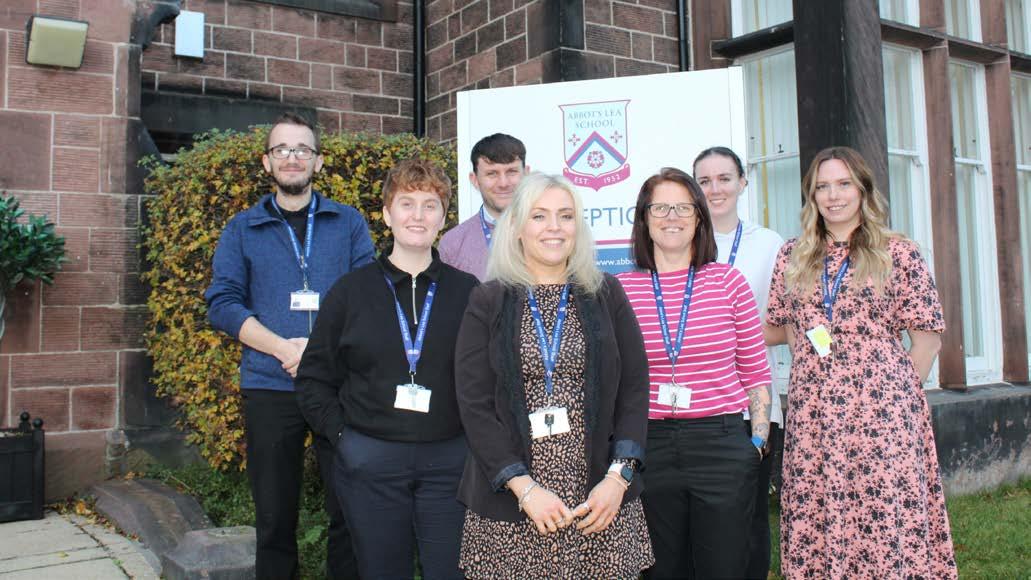
The hub is designed to offer additional help to students who have become disengaged from education or require extra support with complex needs, including most challenging behaviours. In short, the innovative analytical and therapeutic team works alongside school staff to improve attendance, behaviour and through both, success of the young people with autism and complex learning and social, emotional and mental health needs.
The school proudly adopts a positive behaviour support philosophy, stating that:
• All behaviours happen for a reason
• There are four basic functions of behaviour
• Appropriate behaviour requires skills; we teach these skills
• We never give up on
our students
As a result, rather than rewarding or punishing specific behaviours, the school seeks to understand the function of the behaviour and, by assessing the social and physical environment in which the behaviour happens, it uses this understanding to develop support that improves the quality of life for the person and those around them. In doing so, the school always keeps the student at the centre of its work, with their views and those involved in their education and care (including family) central to the programme of support.
The PBS service and the support hub is headed up by the school’s positive behaviour support leader,Claire Welch. Claire is a Board Certified Behaviour Analyst (BCBA), who has worked with children and adults with complex needs and challenging behaviour for the past 18 years, across a range of settings in the North West and North Wales.
Claire’s vision for the hub is to ensure that every child leaves school with the skills to lead a full and
meaningful life reducing the risk of crisis behaviours and possible intrusive support or incriminating social sanction.
Six positive behaviour support assistants have also joined the team and provide support to assess students’ needs and support class teams in creating positive risktaking, skills’ development and relationship-building, as identified in the functionbased analysis.
The hub is located on site of Abbot’s Lea School and is split into two main functions: the first space supports students to reengage with education where they struggle to attend school, and the second space supports students with highly challenging behaviours when these lead to dysregulation and disengagement from their class-based programme of study.
Claire Welch said: “I was attracted to the role initially due to Abbots Lea School’s ambition to be the best school specialist school in the world. Alongside this, having met the headteacher and the senior leadership team, I was excited at the prospect of being able to create a resource that provides bespoke support for the students with most complex needs who don’t always get the help and understanding they deserve.”
Headteacher of Abbot’s Lea School, Mrs Ania Hildrey, said: “Our school
never gives up on students. We aim to operate a nonexclusion policy and yet, over time, like many other schools, we have found ourselves in a place where “nothing worked” for some of the most complex of our youngsters.
“Rather than give up, we have worked hard to come up with an innovative solution. Having piloted, over the past two years, a nurture provision approach, we learnt a lot. Some of the strategies used worked well and many did not add value at all. This led to a refined project: a truly multi-disciplinary approach that blends various schools of thought and methods of working to best support the ever-growing complexity of our population.
“The creation of our PBS service and the support hub has already transformed lives of some of our students and we have only just begun. Furthermore, the insertion of new expertise into the staff team has reinvigorated us all – after all, if teachers stop learning, the learning stalls, too!
“We understand that all behaviours happen for a reason, and we have taken it upon ourselves to delve deeper into what the most challenging behaviours might mean, so that we can find the right solution for each individual young person in our care, and ensure they have access to the best education and, more importantly, life’s opportunities, possible.”
20 ISSUE 67 • WWW.EDUCATIONFOREVERYBODY.CO.UK
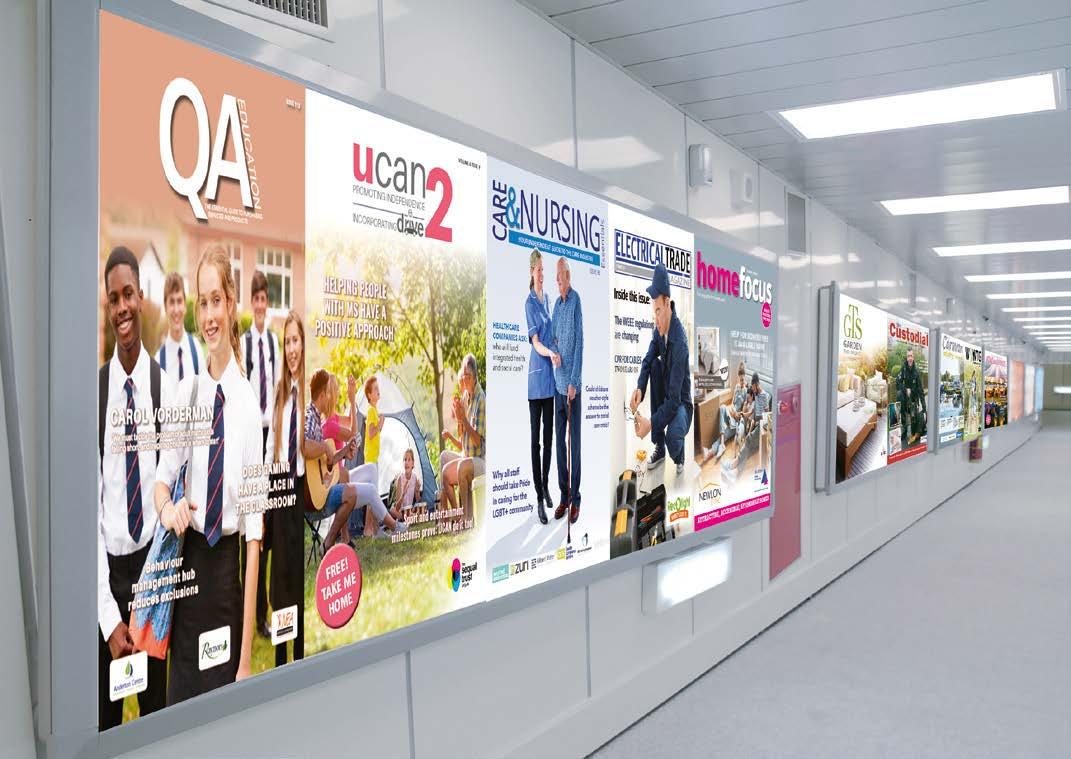



Subscribe to our magazines today www.euromediaal.com
Supporting children’s social and emotional wellbeing Brick by Brick®
Dr.
With nearly 78% of autistic children experiencing co-occurring mental health conditions, such as anxiety or depression, it has never been more important to actively support autistic children with their social and emotional development, in a way that respects their natural styles of learning and communication, and builds on the skills that they already possess. Creating a safe and accepting space where neurodivergent children can meet others and play together around a shared interest can help them to grow in confidence, develop
a sense of belonging, and have more opportunities to form meaningful friendships.
At Play Included®, we have worked with the LEGO Foundation, autistic consultants, and academic experts to develop the Brick-by-Brick® programme, a play-based group methodology designed to support children’s social and emotional wellbeing, communication, and motor skills. Children know it as ‘Brick Club’.
Designed from research on the importance of learning through play and acceptance of neurodiversity, the Brick-by-Brick® programme offers children positive, meaningful
experiences in a playful and accepting environment. Through collaborative LEGO® play, children have fun, make friends, and develop their communication skills, confidence, and social and emotional wellbeing.

Relationships
Brick Clubs provide a safe space for children, between six years and adulthood, to collaborate with their peers who have a shared interest in LEGO bricks. Children who take part in Brick Clubs work together to build LEGO models: they can either build sets following instructions or they can creatively design their own models in collaboration with
22 ISSUE 67 • WWW.EDUCATIONFOREVERYBODY.CO.UK WELLBEING
Gina Gomez de la Cuesta, Clinical Psychologist, Founder and Director of Play IncludedMeaningful connections play an important role in supporting children’s mental health and wellbeing.
Images courtesy of Ilusionistas
their friends, depending on what they prefer and how far along in the programme they are. As they build, children communicate together about their task, often making friends in the process that continue beyond the session.
Communication
While autistic children can be misunderstood due to their different natural ways of communicating, they have the same need and right as all other children to feel accepted. Research has found that autistic individuals often communicate very effectively when they are together with other autistic individuals.
LEGO model building is a fun and enjoyable way for children to share a focus and communicate together about what they are doing.
In Brick Clubs, children are encouraged to communicate in a way that works for them, and in a way that allows everyone to understand each other. This safe environment for children to be themselves is essential to reduce anxiety around joining in conversations, asking questions and practising the use of new words and phrases.

Understanding
Relationship building is mutual, and the Brick-by-Brick® programme is an inclusive concept, enabling neurotypical children to learn and engage alongside their neurodivergent peers. Collaborative play with LEGO bricks provides opportunities for all children to feel accepted and valued. As such, it is a valuable tool for breaking down the barriers to understanding and acceptance that autistic people can
face in their communities. It can also be a helpful place for children who share a diagnosis to come together with others who share similar experiences and preferences. So, by introducing LEGO play as a tool for collaboration, young people will be supported to have meaningful social opportunities, develop friendships and a sense of belonging, enabling them to thrive in the world beyond the school gates and throughout life.

WWW.EDUCATIONFOREVERYBODY.CO.UK • ISSUE 67 23 NEWS DIGEST
WELLBEING
Why are we ignoring the diversity in neurodiversity?
Too often, our conversations about inclusion take place in siloes: mental health in one corner, race in another, and neurodiversity in another. But segmenting these conversations prevents us from taking action: as Audre Lorde says “there’s no such thing as a single-issue struggle because we do not live single-issue lives”.
Atif Choudhury, CEO of disabledperson-led social enterprise Diversity and Ability, highlights the disparity in experiences between white neurodiverse people and their Black and brown counterparts: “The impact of neurodiversity can be one of wonder, joy, and celebration for some people. Some people get the opportunity to learn about it early in life and get supported in that learning. For others, due to skin colour, class, or culture, it can be a conversation deeply rooted in shame. Many don’t have the space to find out that their differences could be accepted, let alone seen as an asset.”
Conversations about neurodiversity are becoming more and more commonplace, a welcome shift for
those of us who have spent much of our lives working to hide, mask or downplay the way our brains work in order to fit in.
But, even within the neurodiversity community, we often only hear about one type of person: the successful, white innovator or disruptor who looks and sounds a certain way. Rarely, if ever, is it acknowledged that not everyone fits this description or has the same access to a diagnosis or support.
It’s crucial to understand the impact this has: a 2021 review of neurodiversity in the prison system suggested that half of the UK’s prison population could reasonably be expected to be neurodiverse. When Black people and those from other racially minoritised groups make up 27% of the prison population (and only 13% of the general population), the facts suggest that undersupported neurodiversity in Black and minority ethnic populations is disproportionately linked to incarceration.

Despite the complex barriers to diagnosis, participation and success, neurodiverse People of Colour are
forging change at systemic levels. Atif has partnered with Carolyn Baguma, Inclusion Consultant at Diversity and Ability, to launch the landmark course Neurodiversity: Race and Realities. The course will equip educators and practitioners with a knowledge of the real experiences of Black and brown neurodiverse people, and how we can remove or mitigate the intersectional barriers they face in their day-to-day lives, education and careers. “Until now, there has been an acknowledgement that the neurodiversity sphere needs to be more intersectionally inclusive,” Atif says. “It’s time to move from talk into action.”
How can we work towards an equitable conversation about neurodiversity and one that everyone can participate in? The solution lies in centering the experiences of those who have historically been excluded. This course provides an opportunity to make that a reality. Register your interest in attending the course at info.diversityandability.com/ neurodiversity-race
24 ISSUE 67 • WWW.EDUCATIONFOREVERYBODY.CO.UK NEURODIVERSITY
If our approach to diversity and inclusion isn’t intersectional, it isn’t relevant.
Image courtesy of iStock
Altro explores inclusive design with neurodiversity focus for Clerkenwell
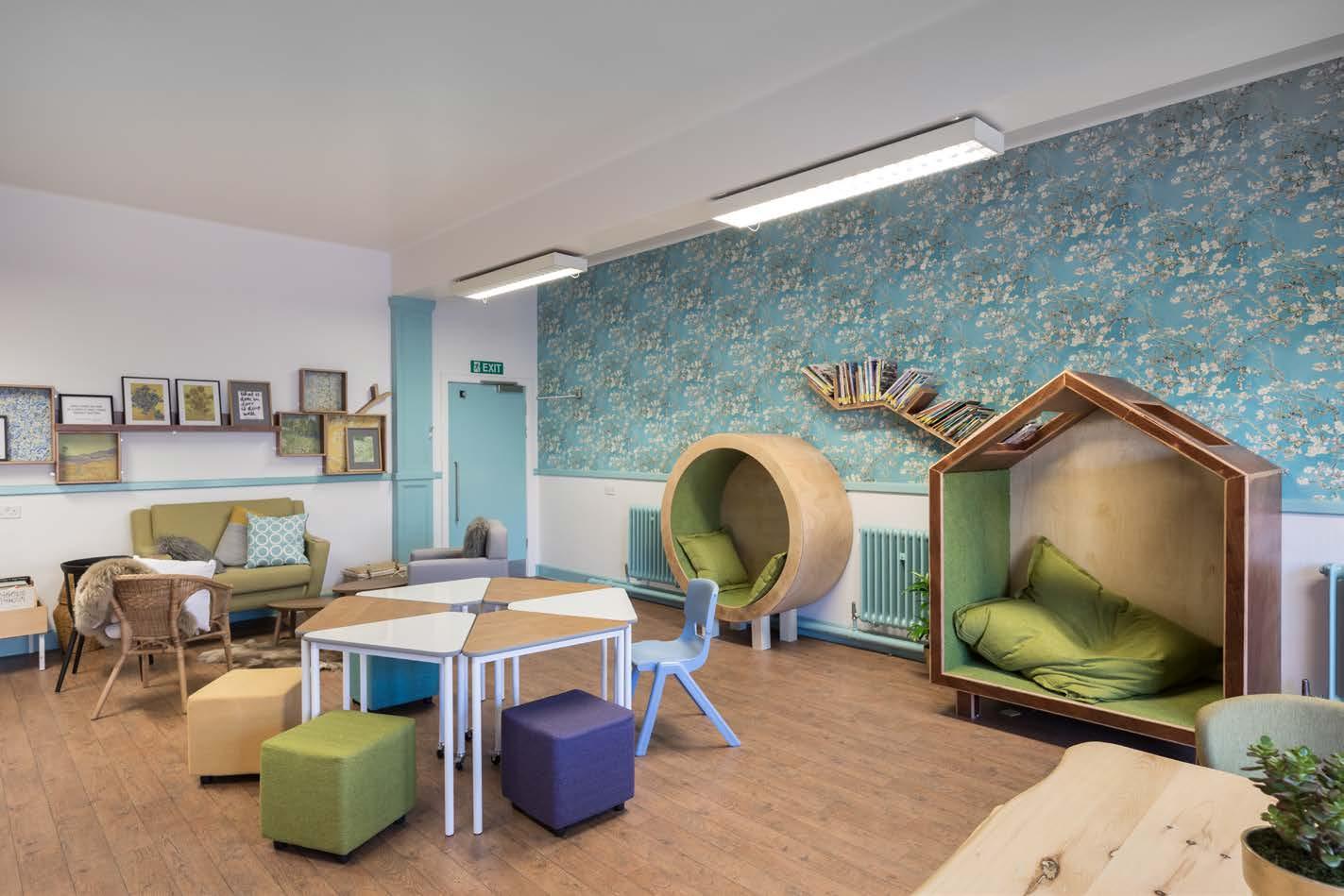
Visit Altro’s showroom during Clerkenwell Design Week to be immersed in a journey of discovery about design for neurodiversity.
By exploring how people experience spaces differently, expert panel discussions, talks and practical workshops, Altro will share best practice on how to design spaces for everyone.
Around 35% of the UK population is thought to be neurodiverse, meaning that their brain functions, learns and processes information differently. Altro has been championing the importance of designing spaces to be inclusive through its forum events for specifiers and end-users, and its recent ‘Designing for Neurodiversity’ CPD. Altro’s showroom programme for Clerkenwell Design Week draws and expands on this knowledge and experience.
Across the three-day programme, Altro will facilitate talks and discussions with leading experts in the field. Professor Anastasios Maragiannis, award-winning Professor of Inclusive Design at the University of Greenwich, London, will lead a panel discussion. Other speakers include:
Sara Darwin, architect and Certified Passivhaus Designer, and principal
of Phi Architects. She specialises in low energy sustainable design and designing spaces for autism.
Stephanie Kyle, architect and inclusive design consultant at Maber Architects. Her role involves advising other architects, clients and key decision makers on best practice for inclusivity and integrating inclusive
design within every architectural stage.
Maria Luigia Assirello, who leads on Floyd Slaski’s mental health portfolio. Maria specialises in design for autism friendly environments and has written papers for various groups including the National Autistic Society.
For those looking for hands-on activities, Altro’s CDW programme includes virtual reality experiences to explore how people experience spaces differently and drop-in mood board workshops looking at how materials help create an inclusive built environment, with sector focuses on education, workspaces, health, home environment and transport.
Make Altro an essential part of your Clerkenwell Design Week - visit the showroom at 15 Clerkenwell Green from 9am, 23rd to 25th May.
To find out more about Altro’s Designing for Neurodiversity’ CPD, contact the Customer Care Centre on 01462 489516, email cpd@altro.com or visit www.altro.com/uk/services/ other-services/continual-professionaldevelopment.
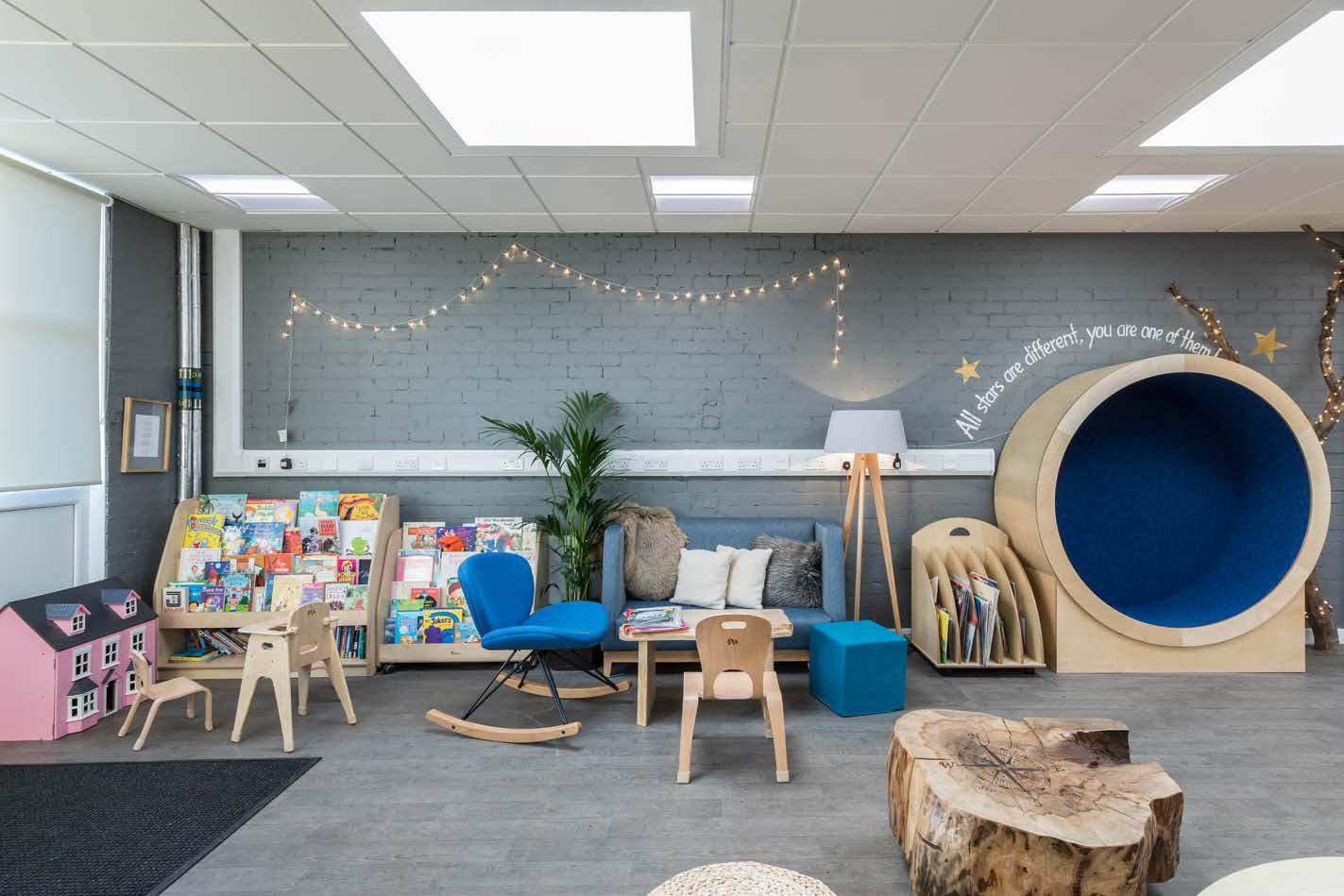
WWW.EDUCATIONFOREVERYBODY.CO.UK • ISSUE 67 25 NEWS NEURODIVERSITYDIGEST
Images courtesy of Altro
Supporting neurodiversity in the workplace
While much has been done to embrace these conditions in the education system, there is still work to be done to ensure that neurodiverse employees have the right support to allow them to fulfil their roles to the best of their ability.
A recent legal case, R Bryce v Sentry Consulting Ltd, is a cautionary tale for businesses that fail to acknowledge the role neurodiversity plays in the workplace.
The case was brought by security guard, Raymond Bryce, who suffers from dyslexia and Asperger’s Syndrome. Having arrived late for his shift on several occasions, he had been pulled aside by management. However, Bryce explained that his dyslexia made it difficult to wake up early, plan-ahead and read the time. Attempting to mitigate the issue, he suggested to his employer that a grace period of 15-20 minutes in the morning would be helpful. However, instead of working with him to find a suitable solution, the security company merely stopped assigning him shifts.
Bryce accused Sentry Consulting of failing to make reasonable adjustments to support his neurodiversity, leaving the business open to a discrimination claim. It was upheld by the employment tribunal, which found that his neurodiversity made it challenging for him to maintain the same timekeeping and organisation skills as a neurotypical person. Bryce is now in line for compensation, while Sentry must shoulder both a financial hit and reputational damage as a result of the high-profile case.
The ruling demonstrates the importance of having policies and procedures in place to support neurodivergent people at work. An employee’s neurodiversity could qualify as a disability under the Equality Act 2010 so it’s vital to
ensure that staff are supported and not at risk of discrimination in order to safeguard against expensive, damaging legal action. People with disabilities and long-term health conditions have certain rights and protections under the law and businesses must be prepared to make reasonable adjustments to guard against not only against discriminatory behaviour, but harassment and victimisation too.
The term ‘reasonable adjustment’ will vary depending on the needs of the individual, their role and the needs of the organisation, however there are several straightforward things companies can do to support neurodivergent workers. Those include flexibility around shift times and methods to help tackle any issues with focus, such as taking shorter breaks throughout the day and making sure that there are spaces to relax quietly during those times.
Communication can also be a real challenge for many neurodiverse people, so allowing them to work from home for some or all the week could be beneficial. It’s really important to remember that all of these conditions we are talking about are completely unique to each person - while the law offers a guideline and a framework for policy, every employee and their needs should be assessed and supported
independently.
Companies should take the time to audit their mission statements, vision documents and other policies to ensure that diversity and inclusivity is championed. Think about the culture within the business and whether it feels inclusive. Is it open and friendly? Would it allow neurodiverse people to be honest about any challenges they are experiencing and feel that they would be supported through those? Also bear in mind that neurodiverse people are often impacted by their surroundings in a way that their neurotypical colleagues aren’t. Think about bright lights, loud noise and crowds and whether any of those factors can reasonably be mitigated. Again, flexibility is key, ensuring people are assigned an appropriate role and supported wherever possible in managing their condition day-today in the workplace.
There is a plethora of things businesses can do to support neurodiversity in the workplace, creating and nurturing a positive, friendly and inclusive culture. Investing time in ensuring that policies support neurodiverse employees will not only safeguard against legal challenges, but maintain a healthy bottom line.
Chris Garner is MD of HR and Employment Law specialist, Avensure

26 ISSUE 67 • WWW.EDUCATIONFOREVERYBODY.CO.UK NEURODIVERSITY
There’s no doubt that neurodiversity is becoming more widely recognised and understood, with much greater awareness around what it means and what conditions like autistic spectrum disorders (ASD), dyslexia and dyspraxia entail.


















 By Dr Leanne Johnson
Dr Leanne Johnson is Head of Trauma Informed Practice at Outcomes First Group (OFG), a specialist provider of education and care for autistic children, young people and adults and those with complex needs.
By Dr Leanne Johnson
Dr Leanne Johnson is Head of Trauma Informed Practice at Outcomes First Group (OFG), a specialist provider of education and care for autistic children, young people and adults and those with complex needs.
































































